Communities and local businesses
Exploitation of children and young people is happening in North Yorkshire. Child exploitation is a form of child abuse; it can happen anywhere, to anyone and by anyone. The best way of tacking child exploitation is to raise awareness of it, so we can spot signs as early as possible and speak up about any concerns. We all have a responsibility to help protect children and young people from exploitation.
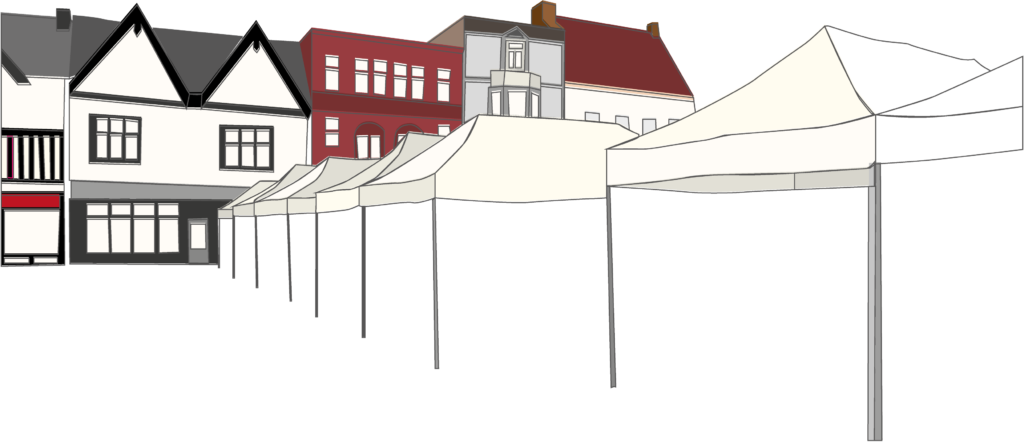
Jump to:
- #LookCloser campaign
- Communities: What to look out for (in the day as well as night).
- Spotting a young person who may have run away.
- Businesses: What to look out for (in the day as well as night).
- Safeguarding in Sport
- Report a concern.
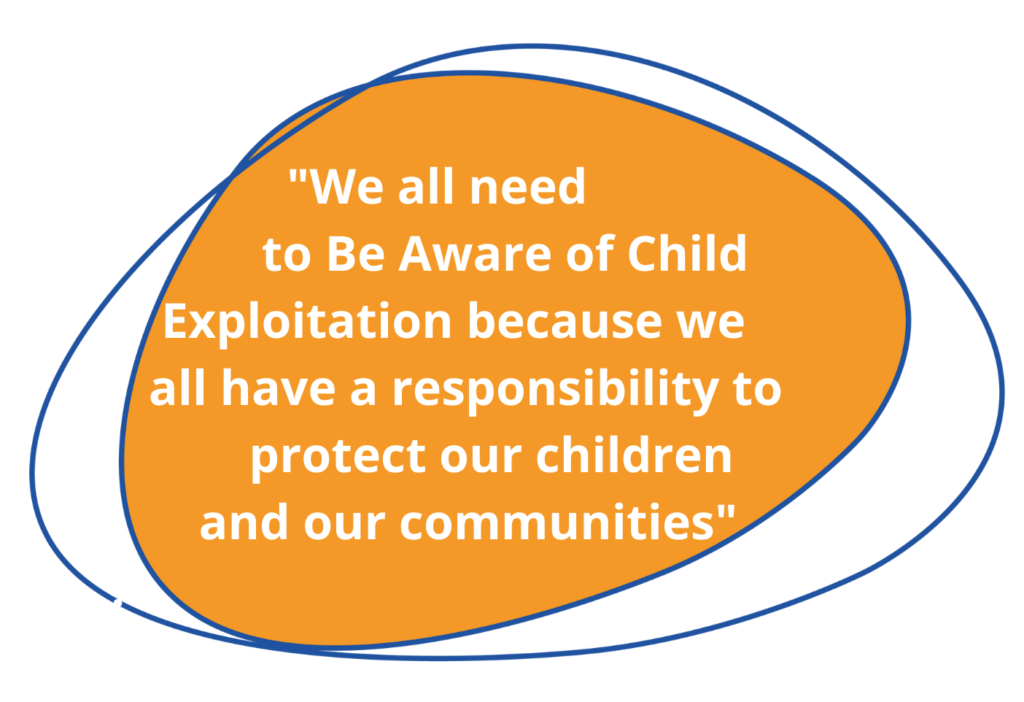
In our communities and local businesses we often see things that don’t quite seem right, for example:
- Young people arriving or leaving community areas in cars with older peers or adults.
- Adults befriending young people in local space and places.
- Young people in or around premises and communal spaces at unsociable hours.
Is something doesn’t seem right, think; could this be exploitation?
As part of North Yorkshire Safeguarding Children Partnerships ‘Multi Agency Child Exploitation Strategy’ (MACE) we aim to tackle exploitation in the places and spaces that it is happening in our communities and businesses and this is where we need you help; we need you to:
- Learn about what Child Exploitation is.
- Recognise the signs of Child Exploitation
- Understand that perpetrators of exploitation can target businesses as well as places and spaces in our community to target and groom young people.
- Raise awareness in your communities and businesses about child exploitation. Share our resources on your social media pages and pledge to Be Aware of child exploitation and help tackle it.
- If you see something that’s not right, report it. Your information could be the vital piece of a jigsaw that can protect a child or young person from exploitation. Information can be shared about a crime (however small or insignificant you think it may be) to North Yorkshire police by calling 101 (or 999 in an emergency) or online by clicking here. Anonymous information can be shared via Crimestoppers – 0800555111. If you have concerns about the welfare of a child click here for more information.
#LookCloser
The Children’s society #LookCloser campaign developed in partnership with the National County Lines Co-ordination Centre and British Transport Police, encourages everyone to learn the signs of child exploitation and how to report it.

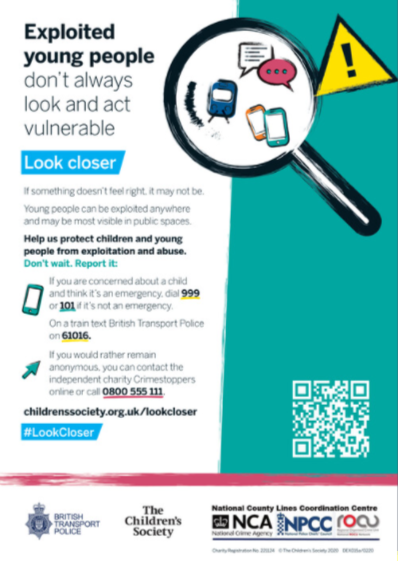
Communities: What to look out for (in the day as well as the night):
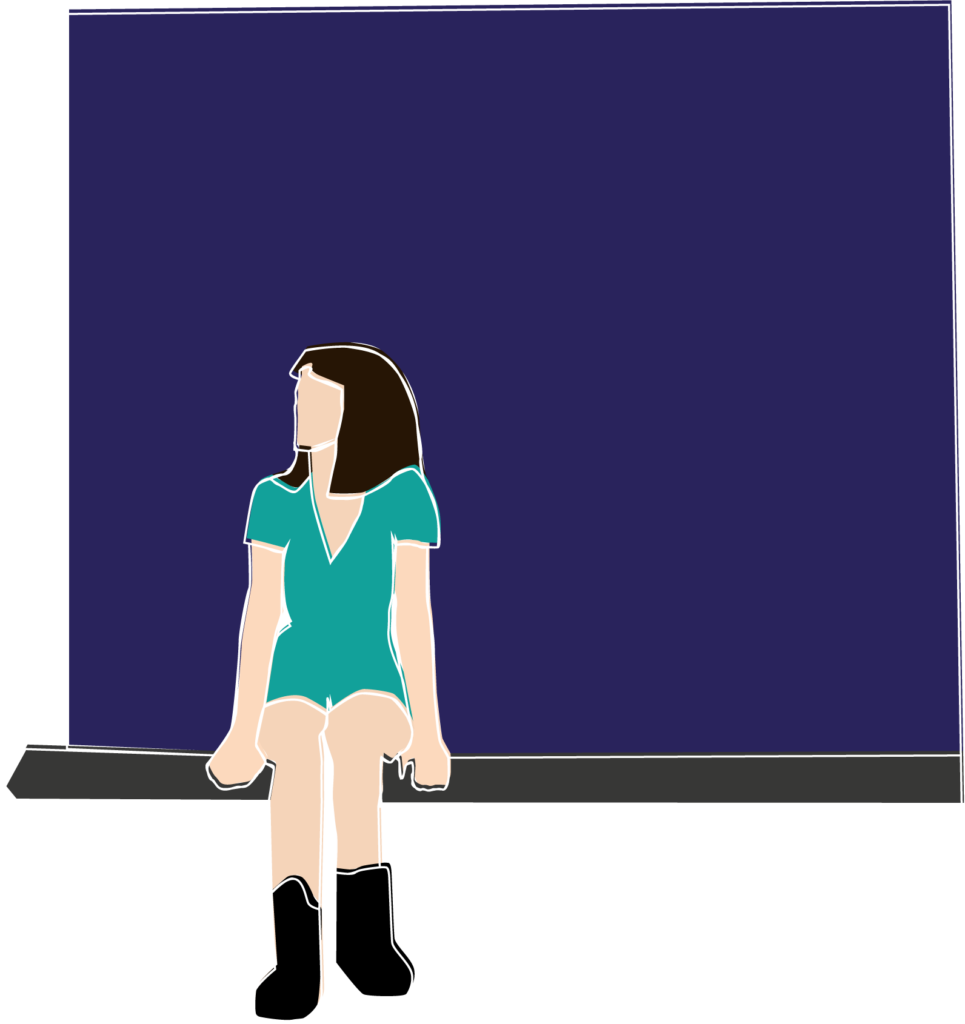
- Young people (both girls and boys) being collected and taken to hotels/b&bs/parties at odd times
- Young people being picked up from other cars.
- Young people who look worried, frightened or distressed in the company of adults or their peers.
- Being instructed or controlled by another individual.
- Young people who are in a vulnerable state due to excessive drink or drugs, and who don’t know where they are going, accompanied by adults.
- Young people travelling alone, particularly in school hours, late at night or frequently.
- Young people being dropped off at any location that causes you concern.
- Frequent suspicious activity in the same place
If you see something that’s not right, report it. Your information could be the vital piece that can protect a child or young person from exploitation. Information can be shared about a crime (however small or insignificant you think it may be) to North Yorkshire police by calling 101 (or 999 in an emergency) or online by clicking here. Anonymous information can be shared via Crimestoppers – 0800555111. If you have concerns about the welfare of a child click here for more information.
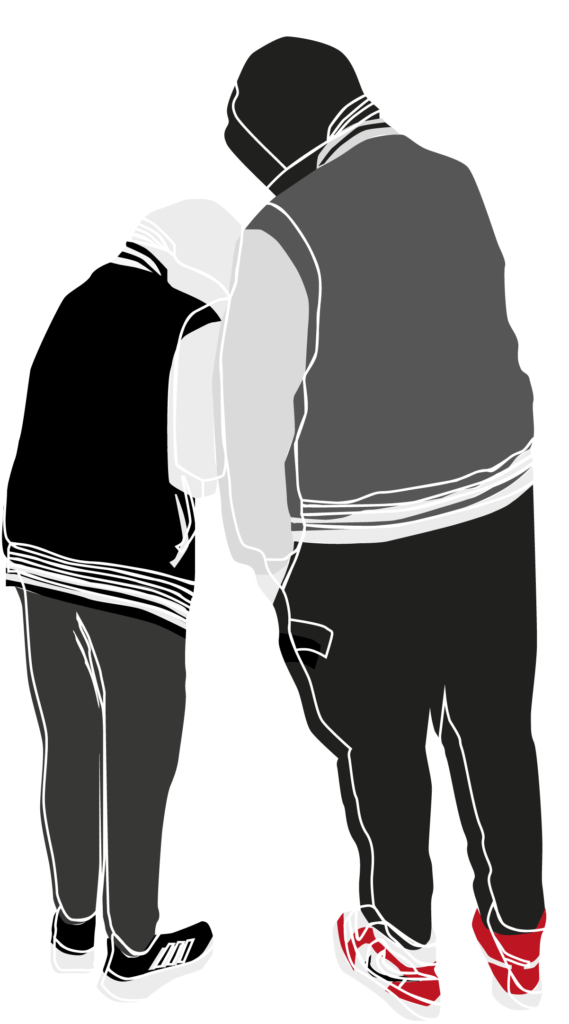
Running away:
Young people who have run away from home are often at high risk of exploitation: Looking out for the following signs can help a young person at a crucial time:
· too young to be travelling alone?
· or travelling with someone who doesn’t appear to be a friend or family member
· trying to catch a lift into the town from a rural area?
· in a uniform but out and about during school hours?
· wearing clothes that are inappropriate for the weather?
· looking lost?
· short of money?
· asking for directions?
· carrying a significant number of belongings with them?
· giving a story that seems implausible and involves needing to get to a place some distance away?
· clearly frightened and anxious?
If you spot a young person who you are concerned has run away:
≥ don’t attempt to rescue them or restrain them
≥ be sympathetic and ask them if they’re ok
≥ report it using the NYSCP link.
≥ contact the Police on 101 to report any concerns, even if the child says they’re fine
≥ ring 999 if you believe the child is in immediate danger
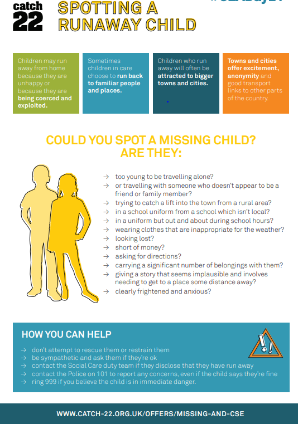
Local businesses: What to look out for (in the day as well as the night):
Even if you don’t work with children directly, whatever business or organisation you work in, you still have a responsibility to help protect children from exploitation and report and concerns you may have.
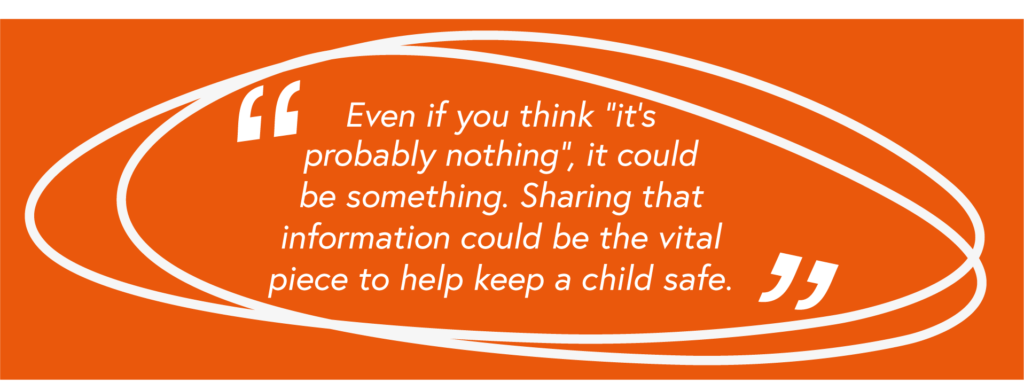
Barnardo’s animated film shows how frontline workers in the night time economy can play and important role in helping keep young people safe from sexual exploitation.
Do you see me? Is a short film to raise awareness within the hotel industry about Child Sexual Exploitation and trafficking. It shows how staff employed in the hotel industry how to recognise the signs and what to do if they suspect children are being exploited and trafficked on their premises:
Possible signs of exploitation to look out for:
A lot of visitors to and from one room, including adults or young people
– Last minute, or walk-in bookings, particularly late at night.
– A frequent guest at a hotel room seen with a range of different young people.
– Young people with adults where there is no obvious appropriate relationship, something doesn’t feel right or other signs are present
– Parties in rooms
– Evidence of drugs, alcohol, sexual activity such as condom wrappers and lubricants
– Guests insisting on paying cash
– Young people loitering in the lobby area or hallways
– Guests refusing to provide ID
– Young boys and girls looking scared, withdrawn, being spoken to in an inappropriately sexual or aggressive manner
– Guests who appear to be secretive about their stay or who try to conceal their activities in their room
– Young boys and girls in possession of or under the influence of drugs and/or alcohol
– Guests who request to be close to fire exits or take a particular interest in the location of their room
If you see something that’s not right, report it. Your information could be the vital piece that can protect a child or young person from exploitation. Information can be shared about a crime (however small or insignificant you think it may be) to North Yorkshire police by calling 101 (or 999 in an emergency) or online by clicking here. Anonymous information can be shared via Crimestoppers – 0800555111. If you have concerns about the welfare of a child click here for more information.
Licensed Premises can be used as locations to exploit and abuse vulnerable children. A premise is particularly vulnerable if it is a location where children congregate, or where children can be easily accessed by offenders. Locations of concern include takeaways and food outlets, alcohol outlets, shopping centres, parks and areas with no parental supervision.
Signs to look out for:
• Adults befriending young people and buying them food, drinks and cigarettes
• Young people under the influence of drugs or alcohol
• Girls or boys with older people who they are behaving in an intimate way with
• Child being taken to areas of licensed premises that are not supervised or security checked
• A customer of the premises seen with different young people
• Same child/children being seen at the premises with different adults
• Young person who appears under the control or instruction of others (adults or peers)
• Young person shoplifting, potentially for exploiters
• Young people that look distressed, intimidated, frightened, dishevelled or disorientated
• Young people in the premise at unsocial hours
• You may overhear conversations or witness concerning activity within the premises
If you see something that’s not right, report it. Your information could be the vital piece that can protect a child or young person from exploitation. Information can be shared about a crime (however small or insignificant you think it may be) to North Yorkshire police by calling 101 (or 999 in an emergency) or online by clicking here. Anonymous information can be shared via Crimestoppers – 0800555111. If you have concerns about the welfare of a child click here for more information.
Taxis are often used by perpetrators to transport children (both girls and boys) between hotels, pubs and other places where they are exploited. So it’s not just a good idea for taxi drivers to be able to spot the signs of exploitation, it’s their responsibility.
Exploited children may be too scared or ashamed to ask for help themselves, or they may not recognise that they are being exploited. Taxi drivers are in a unique position to notice when all may not be right with passengers in their vehicle, pass their concerns on to the police – and potentially save a child from exploitation
– Young people (both girls and boys) being collected and taken to hotels/b&bs/parties at odd times
– Young people being picked up from other cars
– Young people who look worried, frightened or distressed in the company of adults
– Young passengers who are in a vulnerable state due to excessive drink or drugs, and who don’t know where they are going, accompanied by adults
– Young passengers being dropped off at any location that causes you concern.
– Frequent suspicious activity in the same place
– Men who regularly request taxi rides to and from location – taking young people with them.
– Young passengers going to A&E or clinics accompanied by someone who is not a parent
If you see something that’s not right, report it. Your information could be the vital piece that can protect a child or young person from exploitation. Information can be shared about a crime (however small or insignificant you think it may be) to North Yorkshire police by calling 101 (or 999 in an emergency) or online by clicking here. Anonymous information can be shared via Crimestoppers – 0800555111. If you have concerns about the welfare of a child click here for more information.
Children who are exploited often carry cash obtained from their exploitation and will visit bank branches to pay it into their abuser’s account. They may also be made to launder money or transfer criminal proceeds through their own bank account. In some circumstances young people sell their whole account for a small fee to perpetrators.
Is a child or young person visiting your branch:
– Anxious, frightened, angry, showing signs of neglect or displaying other behaviours that make you worried about them?
– Behaving aggressively with you or other bank staff?
– Visiting a branch far from the account holder’s address?
– Paying in a large quantity of cash?
– Being instructed or controlled by another individual? Or is someone keeping an eye on them from a distance?
– Receiving frequent messages and calls? Do they appear anxious when answering?
– Is there concerning activity related to a child or young person’s account?
– Are they paying in small amounts frequently?
– Is there more activity than you would expect to see on a young person’s account?
– Are there cash deposits or transfers from unknown sources?
– Are there a lot of transport or accommodation transactions on the account?
-Do the details on the account match to the person you are expecting.
Young people are frequently approached at cash points or when leaving banks as these are clear indicators they have access to financial accounts.
· Consider the security at these points your organisation has.
· Is anyone looking suspicious or approaching people at cash points?
· Is there information about how to access support at cash points?
If you see something that’s not right, report it. Your information could be the vital piece that can protect a child or young person from exploitation. Information can be shared about a crime (however small or insignificant you think it may be) to North Yorkshire police by calling 101 (or 999 in an emergency) or online by clicking here. Anonymous information can be shared via Crimestoppers – 0800555111. If you have concerns about the welfare of a child click here for more information.
As a delivery drivers, postal workers, takeaway drivers; you are working within communities and neighbourhoods, travelling through multiple public spaces during shifts. Therefore there may be opportunities for you to identify young people being exploited or abused either within public spaces or within houses.
– Whilst delivering in the community, look out for children or young people who are:
– Looking lost or in unfamiliar surroundings
– Regularly in a public space during school hours or late at night
– On their own or meeting different adults who don’t appear to be parents
– Being instructed or controlled by another individual
– Accompanied by individuals who are older than them.
Exploitation and abuse can also be visible inside houses. The majority of sexual abuse happens inside the family home and vulnerable adults’ properties can be taken over by criminals and used as a base. If you are delivering parcels, takeaways or other items to a house, you may be one of the only professionals in a position to spot and report concerns.
Things to look out for in houses:
– Unaccompanied children visiting a house where only adults live
– Young people who are anxious, frightened, angry, showing signs of neglect or displaying other behaviours that make you worried
– Children with bruises, burns, bite marks or fractures
– Appearing guarded around particular individuals
– Shouting or violence towards a young person
– Increased callers at a property
– Increase in cars pulling up for short periods of a time
– Increased antisocial behaviour at a property
– Not seeing the resident for long periods of time
– Unfamiliar vehicles at the property.
If you see something that’s not right, report it. Your information could be the vital piece that can protect a child or young person from exploitation. Information can be shared about a crime (however small or insignificant you think it may be) to North Yorkshire police by calling 101 (or 999 in an emergency) or online by clicking here. Anonymous information can be shared via Crimestoppers – 0800555111. If you have concerns about the welfare of a child click here for more information.
Safeguarding in Sport
National Working Group have developed a campaign Tackling Child
Exploitation in Sport. Safeguarding
children and vulnerable adults is everyone’s responsibility and this also
applies in the world of sport. This campaign has been
designed specifically for the sports sector to help raise awareness of how
abuse can occur through sport. Our campaign efforts are aimed at parents,
coaches and children in order to help them understand what to look out for and
how to respond to concerns.
Further details including posters for specific sports
and additional resources can be accessed here: CSE in Sports (Sport
England) – STOP CE – (stop-ce.org)
Report a concern:
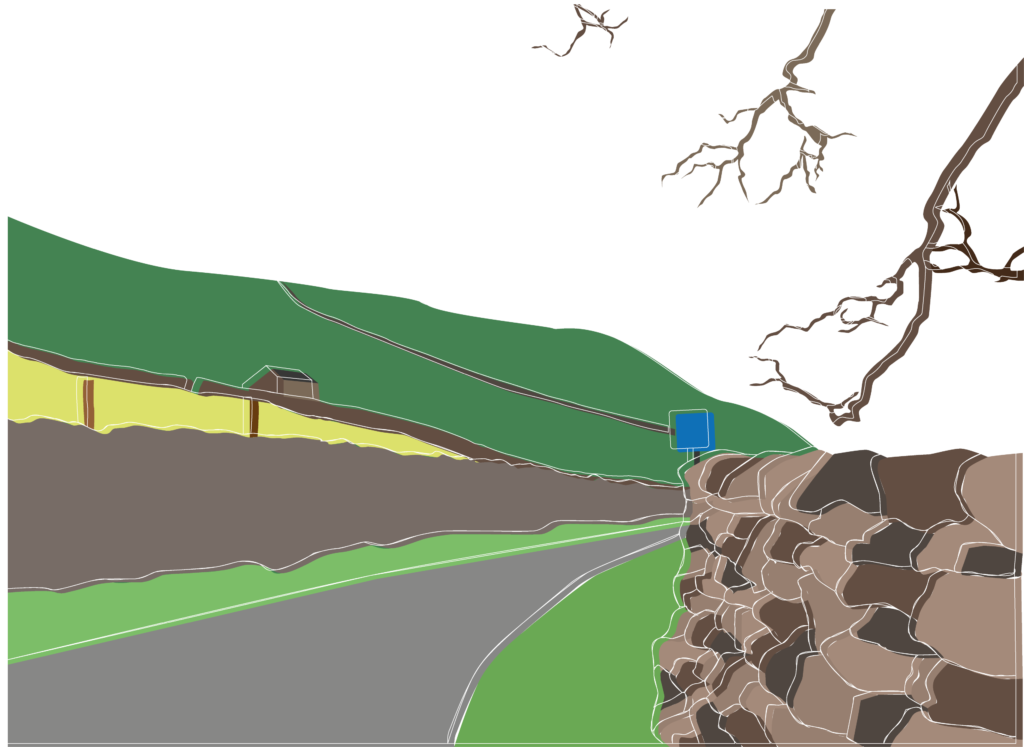




 View all our news
View all our news